人教版(2019)必修第三册Unit 1 Festivals and Celebrations Reading and Thinking 课件 (共35张PPT)
文档属性
| 名称 | 人教版(2019)必修第三册Unit 1 Festivals and Celebrations Reading and Thinking 课件 (共35张PPT) | 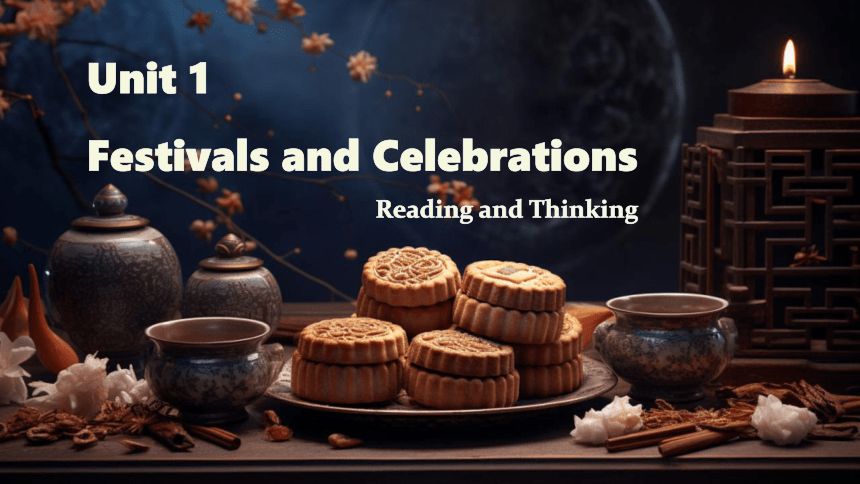 | |
| 格式 | pptx | ||
| 文件大小 | 27.2MB | ||
| 资源类型 | 教案 | ||
| 版本资源 | 人教版(2019) | ||
| 科目 | 英语 | ||
| 更新时间 | 2024-12-23 18:05:41 | ||
图片预览

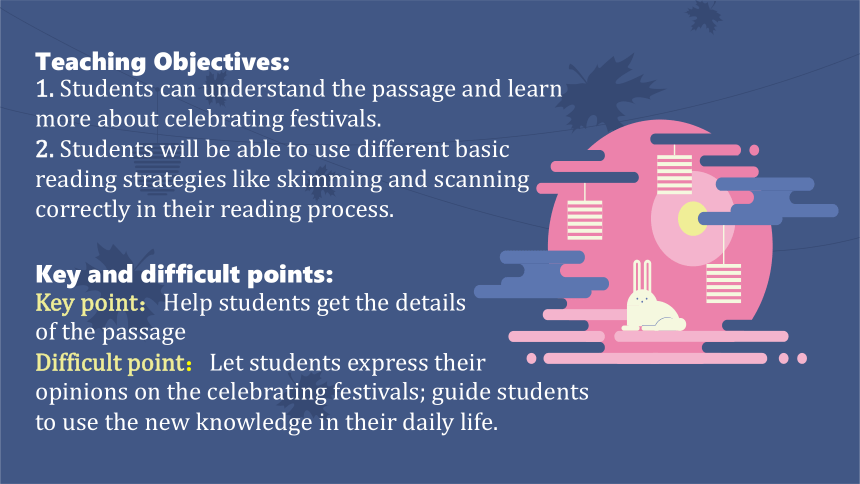
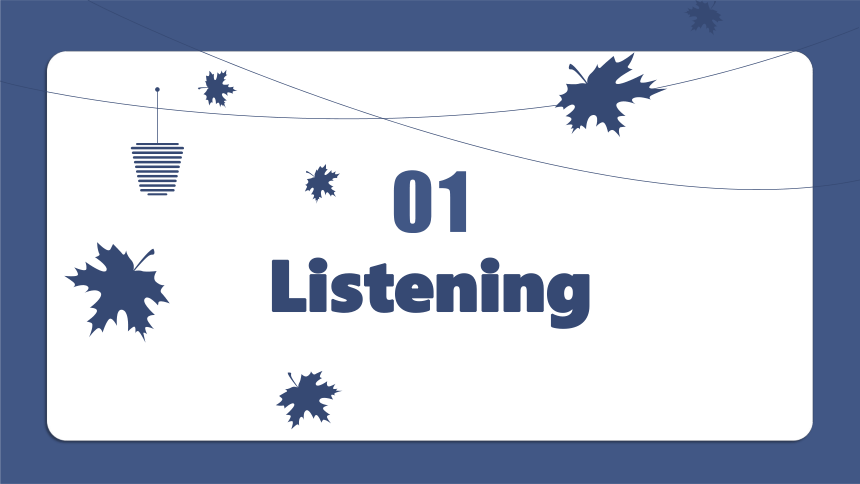
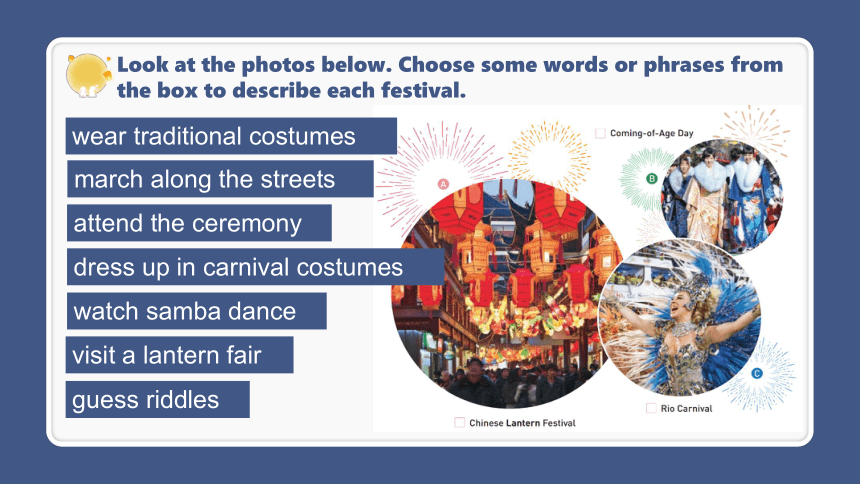
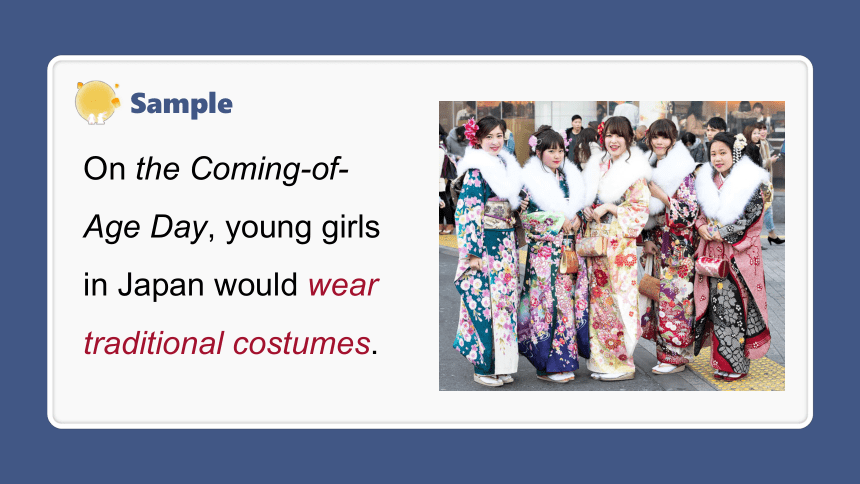
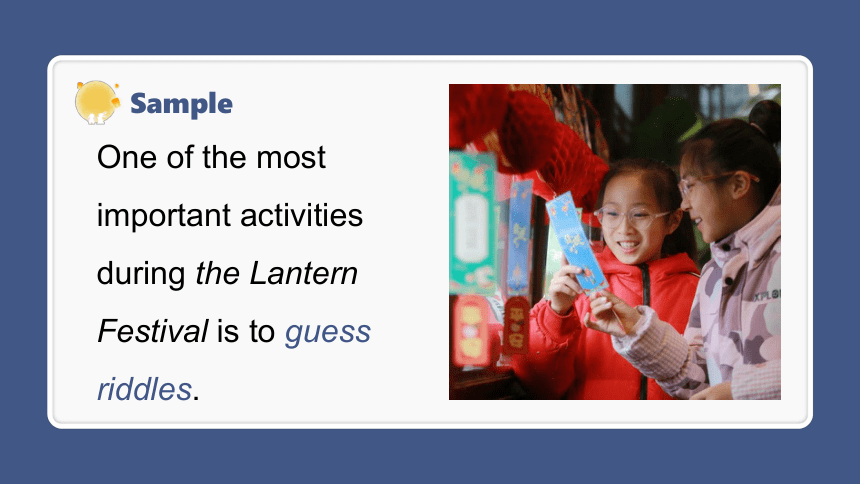
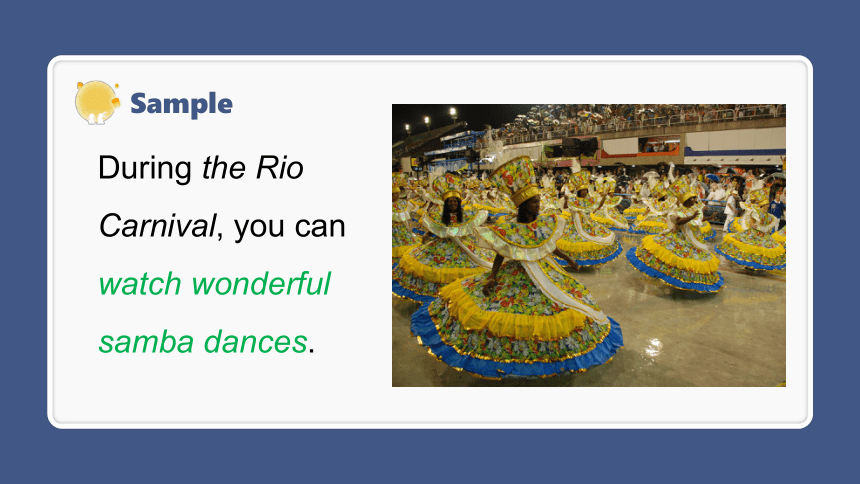


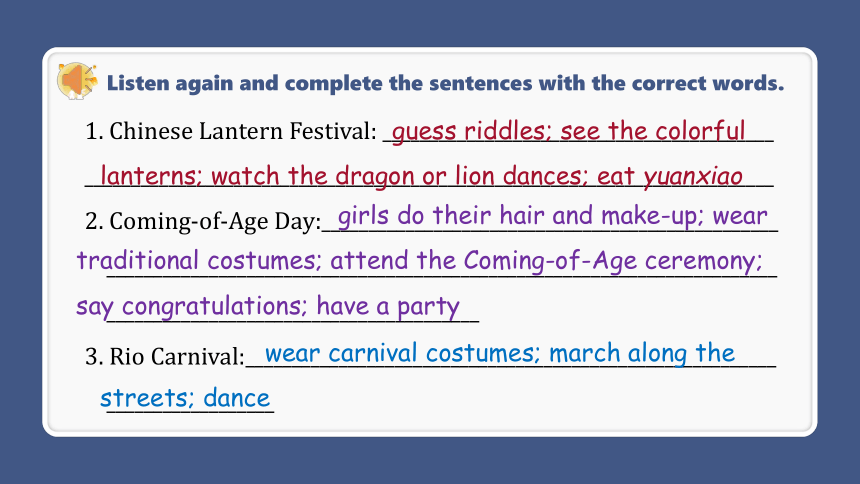
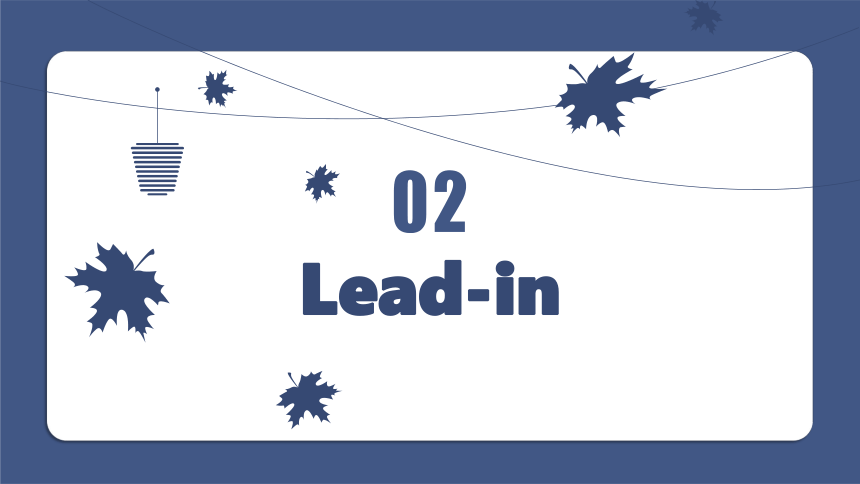
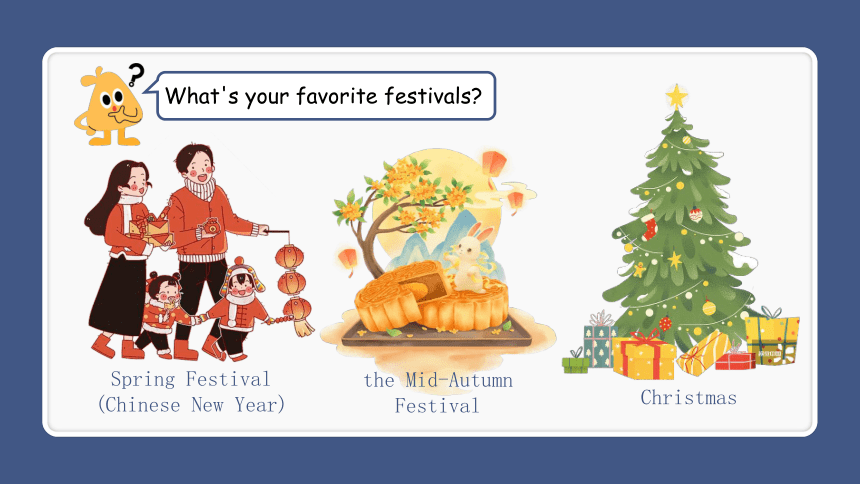
文档简介
(共35张PPT)
Unit 1
Festivals and Celebrations
Reading and Thinking
Teaching Objectives:
1. Students can understand the passage and learn
more about celebrating festivals.
2. Students will be able to use different basic
reading strategies like skimming and scanning
correctly in their reading process.
Key and difficult points:
Key point:Help students get the details
of the passage
Difficult point:Let students express their
opinions on the celebrating festivals; guide students
to use the new knowledge in their daily life.
Listening
01
Look at the photos below. Choose some words or phrases from the box to describe each festival.
wear traditional costumes
march along the streets
attend the ceremony
dress up in carnival costumes
watch samba dance
visit a lantern fair
guess riddles
Sample
On the Coming-of-
Age Day, young girls
in Japan would wear
traditional costumes.
Sample
One of the most
important activities
during the Lantern
Festival is to guess
riddles.
Sample
During the Rio
Carnival, you can
watch wonderful
samba dances.
Listen and write the order of the conversations next to the names of the festivals above. Then match each conversation with the relationship between the speakers below.
_____ a tour guide and members of a tour group
_____ an interviewer and an interviewee
_____ a reporter and a tourist
_____ two friends
A
C
B
Listen for relationships
To listen for a relationship, you need to pay attention to how people talk to each other (e.g. friends usually call each other by first names) and some particular questions in the conversation (e.g. “Could I have the bill, please ” tells us that the speaker is a customer in a restaurant).
Listen again and complete the sentences with the correct words.
1. In Conversation 1, the woman is wearing _______ colors. It took her a long time to do her hair and make-up, and to get _________. She is going to meet her _______ soon.
2. In Conversation 2, Carla advises Li Mei to change her ________________. This is because the weather is _____ and they will be outside for a long time.
3. In Conversation 3, the people are enjoying the ________ show.
bright
dressed
family
dress and shoes
hot
lantern
Listen again and complete the sentences with the correct words.
1. Chinese Lantern Festival: __________________________________________
__________________________________________________________________________
2. Coming-of-Age Day:_________________________________________________
________________________________________________________________________
________________________________________
3. Rio Carnival:_________________________________________________________
__________________
guess riddles; see the colorful
lanterns; watch the dragon or lion dances; eat yuanxiao
girls do their hair and make-up; wear traditional costumes; attend the Coming-of-Age ceremony; say congratulations; have a party
wear carnival costumes; march along the
streets; dance
Lead-in
02
What's your favorite festivals
Spring Festival
(Chinese New Year)
the Mid-Autumn Festival
Christmas
Do you like to celebrate the festivals
WHY
Enjoy the holidays
Be Together with Family
The Discount In Festivals
Pre-reading
03
Predict the main idea from the title and two pictures.
Probably, the text is about ______________________________.
the reasons for festivals and celebrations
Chinese traditional festivals
Foreign festivals
While-reading
03
READ FOR MAIN IDEA
Located the topic sentences in each paragraph.
Para.1 Introduction
Para.2
The harvest festival
Para.3 Changes in customs
Para.4
Commercialised festivals
Para.5 Significance
Identify the main idea of a paragraph
Identifying the main ideas of paragraphs is necessary when analysing a text.
Most paragraphs will have a “topic sentence” that tells you the paragraph’s main idea. It is often the first sentence, but sometimes it is found elsewhere in the paragraph
Read for details
Para.1 Introduction
Festivals are celebrated all around the world. They have a wide range(范围) of origins(起源), such as the seasons of the year, religions, famous figures(人物), and important events. Every festival has its different customs and unique charms. However, no matter how different they may seem, all over the world, the spirit of sharing joy(喜悦), gratitude, love, or peace is common in all festivals.
What are the origins of most festivals
What do most festivals seem to have in common
Read for details
Para.1 Introduction
What are the origins of most festivals
What do most festivals seem to have in common
Different
origins
Common
spirit
seasons of the year
religions
figures
events
sharing joy
gratitude
love
peace
Read for details
Para.2 The harvest festival
Of all the traditional festivals. the harvest(收获) festival can be found in almost every culture. This important agricultural festival takes place after all the crops(农作物) shave been gathered(聚集) in. People celebrate to show that they are grateful(感激的) for the year‘s supply of food. In ancient Egypt, the harvest festival was celebrated during the springtime the Egyptian harvest season. It featured(以……为特色) a parade and a great feast with music, dancing, and sports. Today, in some European countries, people decorate(装饰) churches(教堂) and townhalls with flowers and fruit, and get together to celebrate over a meal. During the Mid-Autumn Festival in China, families gather to admire the shining moon and enjoy delicious mooncakes.
Time
common
different
different
different
common
common
Para2 different common
harvest festivals in
They are _________ for the year's supply of food.
Read for details
Para.2 The harvest festival
ancient Egypt
Europe
China
grateful
Read for details
Para.3 Changes in customs
Customs play a significant(重要的) role in festivals, but sometimes they can change over time. With the development of modern society and the spread of new ideas, some traditions may fade away and others may be established. One example is the typical(典型的) Chinese Spring Festival custom of lighting firecrackers to drive away the evil spirits and celebrate the new year. Nowadays, many big cities have given up this custom in order to avoid air pollution. Another example is Halloween, which slowly became an exciting festival for children, in spite of its religious origins.
before
now
before
now
Para3 before now
Chinese Spring Festivals
Halloween
lighting
__________________
__________ origins
have __________ to avoid air pollution
__________ festival for children
Read for details
Para.3 Changes in customs
firecrackers
given up
religious
exciting
Read for details
Para.4 Commercialised festivals
Festivals are becoming more and more commercial(商业的),with businesses taking advantage of the celebrations. Online shopping websites and social media(媒体) apps have made it much easier for the public to spend more on gifts for their loved ones. Although some believe festivals should not be commercialized others believe the increase in spending is good for the economy and public happiness.
Para2 some others
believe festivals shouldn't be
______________________
believe the spending increase is good for the ___________ and ___________
Read for details
Para.4 Commercialised festivals
commercialized
economy
public happiness
Post-reading
04
Introduction
Body
Summary
para.1
Festivals have common spirit
para.2
Harvest
festival
para.3
Customs change
para.4
Commercialised
festivals
para.5 Importance of festivals
LET’S DRAW A MINDMAP!
WHY DO WE CELEBRATE FESTIVALS
Para. 1 common spirit of festivals
Para. 2 the harvest festival
Para. 3 changes of customs
Para, 4 commercialisation of festivals
Para. 5 the importance of festivals
sharing joy, gratitude, love or peace
ancient Egypt
celebrated during the springtime
a parade, a feast with music, dancing and sports
Europe
decorate churches and town halls and get together
China
the Mid-Autumn Festival
families gather, admire the moon…
Chinese Spring Festival
no longer light firecrackers
a festival for children
Halloween
giving gifts
people's attitudes
reflect people's wishes, beliefs, faiths and attitudes towards life
offer occasions to relax
help us understand ourselves
Language Points
05
However, no matter how different they may seem, all over the world, the spirit of sharing joy, gratitude, love, or peace is common in all festivals.
然而,无论它们( 节日 )看起来多么迥异,在世界各地,分享快乐、感恩、友爱或和平的精神存在于所有节日之中。
no matter how +adj./adv.
“no matter + 疑问词”可以转换成“疑问词 +-ever”这类词有 whatever, whichever, whoever, whomever, wherever, whenever, however 等 。
“no matter + 问词”只能引导让步状语从句,可放在主句前或主句后。
“疑问词 +-ever”既可引导名词性从句,也可引导让步状语从句。
Sentence
Online shopping websites and social media apps have made it much easier for the public to spend more on gifts for their loved ones.
在线购物网站和社交媒体应用程序极大地方便了人们为至亲至爱花更多钱购买礼物。
make it + adj./n. + for sb. to do sth.
在该结构中,it是形式宾语,动词不定式短语作真正的宾语,it 后的形容词或名词作宾语补足语,for 用于引出不定式的逻辑主语。
能用于上述结构的动词还有 find, think, consider, keep, believe, suppose 等。
真正的宾语除了不定式以外,还可以用 that引导从句。
We think it our duty to protect the environment.我们认为保护环境是我们的责任。
I have made it clear that nobody is allowed to smoke here.我已经讲得很清楚,任何人不准在这儿吸烟。
Sentence
Vocabulary
range
a range of (=a variety of) 一系列的;各种各样的
in/within range (of...) 在(……)范围内;在射程内
out of/beyond range (of...) 超出(……)范围;在射程外
in/out of one's price range 在/不在某人能承受的价格范围内
A range of services 一系列服务
a mountain range 山脉
of
练习:The team will hold a range ______ activities, including some training and matches.
gather in 收集;收割,收获 gather round/around 聚集,集合
gather together 聚集起来;合拢 gather up 采集;收拾
gather information 收集信息 gather strength 恢复体力
gather speed 加快速度 gather courage 鼓起勇气
around
gather
练习:The children gathered _________ the stranger, curiously asking him what was in the bag.
Vocabulary
reflect back 反射;把……如实地反映出
reflect from 从……反射出
be reflected in 倒映在;反映在
reflect on/upon 思考;反思
reflect deeply/seriously 深思 /认真思考
on
reflect
练习:You should set aside some time to reflect ______ your successes and failures.
Vocabulary
SEE YOU NEXT TIME
Unit 1
Festivals and Celebrations
Reading and Thinking
Teaching Objectives:
1. Students can understand the passage and learn
more about celebrating festivals.
2. Students will be able to use different basic
reading strategies like skimming and scanning
correctly in their reading process.
Key and difficult points:
Key point:Help students get the details
of the passage
Difficult point:Let students express their
opinions on the celebrating festivals; guide students
to use the new knowledge in their daily life.
Listening
01
Look at the photos below. Choose some words or phrases from the box to describe each festival.
wear traditional costumes
march along the streets
attend the ceremony
dress up in carnival costumes
watch samba dance
visit a lantern fair
guess riddles
Sample
On the Coming-of-
Age Day, young girls
in Japan would wear
traditional costumes.
Sample
One of the most
important activities
during the Lantern
Festival is to guess
riddles.
Sample
During the Rio
Carnival, you can
watch wonderful
samba dances.
Listen and write the order of the conversations next to the names of the festivals above. Then match each conversation with the relationship between the speakers below.
_____ a tour guide and members of a tour group
_____ an interviewer and an interviewee
_____ a reporter and a tourist
_____ two friends
A
C
B
Listen for relationships
To listen for a relationship, you need to pay attention to how people talk to each other (e.g. friends usually call each other by first names) and some particular questions in the conversation (e.g. “Could I have the bill, please ” tells us that the speaker is a customer in a restaurant).
Listen again and complete the sentences with the correct words.
1. In Conversation 1, the woman is wearing _______ colors. It took her a long time to do her hair and make-up, and to get _________. She is going to meet her _______ soon.
2. In Conversation 2, Carla advises Li Mei to change her ________________. This is because the weather is _____ and they will be outside for a long time.
3. In Conversation 3, the people are enjoying the ________ show.
bright
dressed
family
dress and shoes
hot
lantern
Listen again and complete the sentences with the correct words.
1. Chinese Lantern Festival: __________________________________________
__________________________________________________________________________
2. Coming-of-Age Day:_________________________________________________
________________________________________________________________________
________________________________________
3. Rio Carnival:_________________________________________________________
__________________
guess riddles; see the colorful
lanterns; watch the dragon or lion dances; eat yuanxiao
girls do their hair and make-up; wear traditional costumes; attend the Coming-of-Age ceremony; say congratulations; have a party
wear carnival costumes; march along the
streets; dance
Lead-in
02
What's your favorite festivals
Spring Festival
(Chinese New Year)
the Mid-Autumn Festival
Christmas
Do you like to celebrate the festivals
WHY
Enjoy the holidays
Be Together with Family
The Discount In Festivals
Pre-reading
03
Predict the main idea from the title and two pictures.
Probably, the text is about ______________________________.
the reasons for festivals and celebrations
Chinese traditional festivals
Foreign festivals
While-reading
03
READ FOR MAIN IDEA
Located the topic sentences in each paragraph.
Para.1 Introduction
Para.2
The harvest festival
Para.3 Changes in customs
Para.4
Commercialised festivals
Para.5 Significance
Identify the main idea of a paragraph
Identifying the main ideas of paragraphs is necessary when analysing a text.
Most paragraphs will have a “topic sentence” that tells you the paragraph’s main idea. It is often the first sentence, but sometimes it is found elsewhere in the paragraph
Read for details
Para.1 Introduction
Festivals are celebrated all around the world. They have a wide range(范围) of origins(起源), such as the seasons of the year, religions, famous figures(人物), and important events. Every festival has its different customs and unique charms. However, no matter how different they may seem, all over the world, the spirit of sharing joy(喜悦), gratitude, love, or peace is common in all festivals.
What are the origins of most festivals
What do most festivals seem to have in common
Read for details
Para.1 Introduction
What are the origins of most festivals
What do most festivals seem to have in common
Different
origins
Common
spirit
seasons of the year
religions
figures
events
sharing joy
gratitude
love
peace
Read for details
Para.2 The harvest festival
Of all the traditional festivals. the harvest(收获) festival can be found in almost every culture. This important agricultural festival takes place after all the crops(农作物) shave been gathered(聚集) in. People celebrate to show that they are grateful(感激的) for the year‘s supply of food. In ancient Egypt, the harvest festival was celebrated during the springtime the Egyptian harvest season. It featured(以……为特色) a parade and a great feast with music, dancing, and sports. Today, in some European countries, people decorate(装饰) churches(教堂) and townhalls with flowers and fruit, and get together to celebrate over a meal. During the Mid-Autumn Festival in China, families gather to admire the shining moon and enjoy delicious mooncakes.
Time
common
different
different
different
common
common
Para2 different common
harvest festivals in
They are _________ for the year's supply of food.
Read for details
Para.2 The harvest festival
ancient Egypt
Europe
China
grateful
Read for details
Para.3 Changes in customs
Customs play a significant(重要的) role in festivals, but sometimes they can change over time. With the development of modern society and the spread of new ideas, some traditions may fade away and others may be established. One example is the typical(典型的) Chinese Spring Festival custom of lighting firecrackers to drive away the evil spirits and celebrate the new year. Nowadays, many big cities have given up this custom in order to avoid air pollution. Another example is Halloween, which slowly became an exciting festival for children, in spite of its religious origins.
before
now
before
now
Para3 before now
Chinese Spring Festivals
Halloween
lighting
__________________
__________ origins
have __________ to avoid air pollution
__________ festival for children
Read for details
Para.3 Changes in customs
firecrackers
given up
religious
exciting
Read for details
Para.4 Commercialised festivals
Festivals are becoming more and more commercial(商业的),with businesses taking advantage of the celebrations. Online shopping websites and social media(媒体) apps have made it much easier for the public to spend more on gifts for their loved ones. Although some believe festivals should not be commercialized others believe the increase in spending is good for the economy and public happiness.
Para2 some others
believe festivals shouldn't be
______________________
believe the spending increase is good for the ___________ and ___________
Read for details
Para.4 Commercialised festivals
commercialized
economy
public happiness
Post-reading
04
Introduction
Body
Summary
para.1
Festivals have common spirit
para.2
Harvest
festival
para.3
Customs change
para.4
Commercialised
festivals
para.5 Importance of festivals
LET’S DRAW A MINDMAP!
WHY DO WE CELEBRATE FESTIVALS
Para. 1 common spirit of festivals
Para. 2 the harvest festival
Para. 3 changes of customs
Para, 4 commercialisation of festivals
Para. 5 the importance of festivals
sharing joy, gratitude, love or peace
ancient Egypt
celebrated during the springtime
a parade, a feast with music, dancing and sports
Europe
decorate churches and town halls and get together
China
the Mid-Autumn Festival
families gather, admire the moon…
Chinese Spring Festival
no longer light firecrackers
a festival for children
Halloween
giving gifts
people's attitudes
reflect people's wishes, beliefs, faiths and attitudes towards life
offer occasions to relax
help us understand ourselves
Language Points
05
However, no matter how different they may seem, all over the world, the spirit of sharing joy, gratitude, love, or peace is common in all festivals.
然而,无论它们( 节日 )看起来多么迥异,在世界各地,分享快乐、感恩、友爱或和平的精神存在于所有节日之中。
no matter how +adj./adv.
“no matter + 疑问词”可以转换成“疑问词 +-ever”这类词有 whatever, whichever, whoever, whomever, wherever, whenever, however 等 。
“no matter + 问词”只能引导让步状语从句,可放在主句前或主句后。
“疑问词 +-ever”既可引导名词性从句,也可引导让步状语从句。
Sentence
Online shopping websites and social media apps have made it much easier for the public to spend more on gifts for their loved ones.
在线购物网站和社交媒体应用程序极大地方便了人们为至亲至爱花更多钱购买礼物。
make it + adj./n. + for sb. to do sth.
在该结构中,it是形式宾语,动词不定式短语作真正的宾语,it 后的形容词或名词作宾语补足语,for 用于引出不定式的逻辑主语。
能用于上述结构的动词还有 find, think, consider, keep, believe, suppose 等。
真正的宾语除了不定式以外,还可以用 that引导从句。
We think it our duty to protect the environment.我们认为保护环境是我们的责任。
I have made it clear that nobody is allowed to smoke here.我已经讲得很清楚,任何人不准在这儿吸烟。
Sentence
Vocabulary
range
a range of (=a variety of) 一系列的;各种各样的
in/within range (of...) 在(……)范围内;在射程内
out of/beyond range (of...) 超出(……)范围;在射程外
in/out of one's price range 在/不在某人能承受的价格范围内
A range of services 一系列服务
a mountain range 山脉
of
练习:The team will hold a range ______ activities, including some training and matches.
gather in 收集;收割,收获 gather round/around 聚集,集合
gather together 聚集起来;合拢 gather up 采集;收拾
gather information 收集信息 gather strength 恢复体力
gather speed 加快速度 gather courage 鼓起勇气
around
gather
练习:The children gathered _________ the stranger, curiously asking him what was in the bag.
Vocabulary
reflect back 反射;把……如实地反映出
reflect from 从……反射出
be reflected in 倒映在;反映在
reflect on/upon 思考;反思
reflect deeply/seriously 深思 /认真思考
on
reflect
练习:You should set aside some time to reflect ______ your successes and failures.
Vocabulary
SEE YOU NEXT TIME
